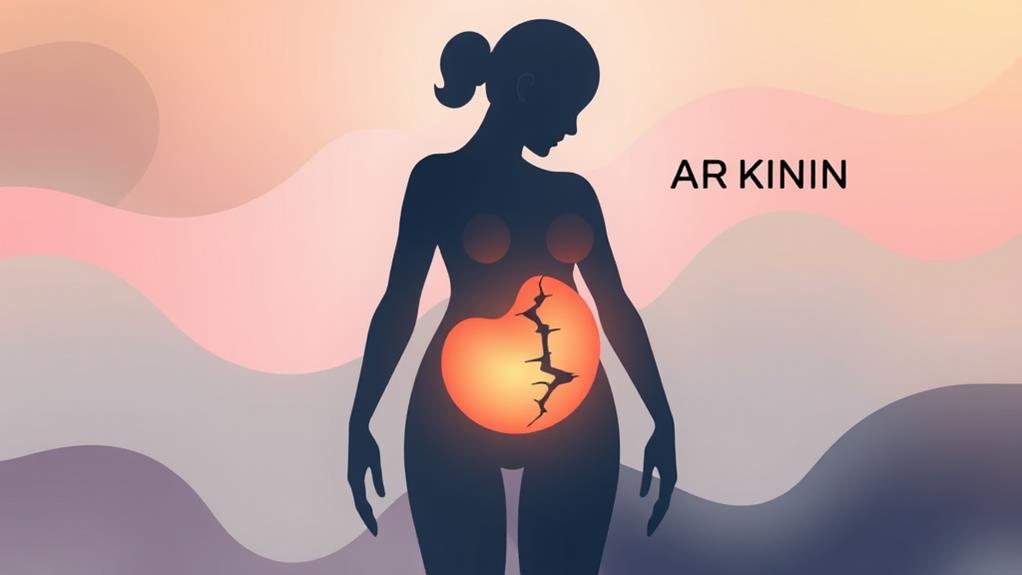If you're experiencing uterus pain early in your pregnancy, you might be wondering what's normal and what isn't. While some discomfort can be a typical part of the process, understanding the underlying causes is essential. You'll want to pay close attention to the type and intensity of the pain, as well as any accompanying symptoms. Knowing when to be concerned can make a significant difference in your peace of mind and well-being. So, how do you distinguish between typical aches and signs that require immediate attention?
Understanding Uterus Pain

Understanding uterus pain during early pregnancy can be crucial for many women. When you first discover you're pregnant, it's normal to feel a mix of excitement and anxiety. You might notice some discomfort in your uterus, which can be unsettling.
It's important to recognize that your body is going through significant changes, and some level of pain can be part of the process. During early pregnancy, your uterus starts to expand to accommodate your growing baby. This stretching can cause mild cramps or twinges, similar to what you might experience during your menstrual cycle.
You might also feel a sense of heaviness in your lower abdomen as your body adjusts. While it's common to experience some discomfort, it's essential to pay attention to the intensity and duration of the pain. If it's mild and occasional, it's usually nothing to worry about.
However, if the pain becomes severe or is accompanied by other symptoms, like bleeding, it's best to consult a healthcare professional. Remember, listening to your body is key, and being informed can help you navigate this exciting journey with confidence.
Common Causes of Discomfort
During early pregnancy, several factors can lead to discomfort in the uterus. One common cause is implantation, which occurs when the fertilized egg attaches itself to the uterine lining. This process can create mild cramping or a tugging sensation, and it's usually nothing to worry about.
You might also experience round ligament pain as your body adjusts to the growing uterus. This pain feels like a sharp or dull ache on one or both sides and often happens when you move suddenly.
Another factor is hormonal changes. As your body ramps up hormone production, especially progesterone, you may feel various sensations in your uterus.
Gas and bloating, caused by slowed digestion, can also contribute to discomfort, making you feel more pressure in the area.
In some cases, you're likely to notice increased sensitivity in your uterus due to the heightened blood flow. While these sensations are generally normal, it's essential to pay attention to how you feel.
If the discomfort becomes severe or is accompanied by bleeding, it's best to consult your healthcare provider for guidance.
Normal vs. Abnormal Pain

It's crucial to recognize the difference between normal and abnormal pain during early pregnancy.
Normal pain often feels like mild cramps or pressure in your uterus, similar to what you might experience during your menstrual cycle. This discomfort usually occurs as your body adjusts to the changes happening inside you. You may notice these sensations especially in the first trimester, and they can come and go without causing significant distress.
On the other hand, abnormal pain can signal something more serious. If you experience sharp, severe pain that doesn't fade, or if it's accompanied by heavy bleeding, fever, or dizziness, it's essential to seek medical attention right away.
Abnormal pain might indicate conditions like an ectopic pregnancy or miscarriage, which require immediate care.
Pay attention to your body and how it feels. If something seems off or if your pain intensifies, don't hesitate to reach out to a healthcare provider.
Trust your instincts—listening to your body is key. Understanding these pain signals can help you navigate your early pregnancy with more confidence and peace of mind.
Symptoms to Monitor
In early pregnancy, being aware of certain symptoms can help you distinguish between what's normal and what might need further attention. You might feel some cramping or light spotting, which can be perfectly normal as your body adjusts to pregnancy. However, it's essential to monitor these symptoms closely.
Pay attention to the intensity of your pain. Mild discomfort can be usual, but if you experience sharp or severe pain that doesn't go away, it could signal a problem. Additionally, if you notice any unusual bleeding, especially if it's bright red or accompanied by clots, it's wise to take note.
Other symptoms to watch include dizziness, excessive fatigue, or unusual swelling, particularly in your legs or arms. Nausea is common, but if it becomes severe and you can't keep food or fluids down, this may require attention.
Also, if you experience any significant changes in your breast tenderness or find that your symptoms suddenly disappear, it's a good idea to keep a close eye on these changes. By monitoring these symptoms, you can feel more empowered during this exciting yet challenging time.
When to Seek Medical Help

Recognizing when to seek medical help during early pregnancy can make a significant difference in your health and peace of mind. If you experience severe or persistent uterus pain, it's essential to reach out to your healthcare provider right away. Sudden, sharp pain may indicate a more serious issue, so don't hesitate to get checked out.
Additionally, if you notice any unusual symptoms, like heavy bleeding, fever, or dizziness, call your doctor immediately. These signs could suggest complications that require prompt attention. It's also crucial to listen to your body; if something feels off, trust your instincts.
Another reason to seek help is if your pain is accompanied by other distressing symptoms, such as painful urination or abdominal swelling. These issues could indicate infections or other conditions that need treatment.
Diagnostic Tests and Procedures
When facing early pregnancy uterus pain, healthcare providers often recommend various diagnostic tests to determine the underlying cause. These tests help ensure both your health and that of your baby.
One common test is an ultrasound, which uses sound waves to create images of your uterus. This can help the doctor see if there's any abnormality or if the pregnancy is developing normally.
Blood tests are another essential tool. They can check your hormone levels, particularly human chorionic gonadotropin (hCG), which is crucial in early pregnancy. Abnormal levels might indicate complications, so your doctor may want to monitor these over time.
Additionally, a pelvic exam allows your healthcare provider to physically assess your reproductive organs for any issues.
In some cases, if the pain is severe or concerning, your doctor might order a CT scan or MRI for a more detailed view. While these tests are less common in early pregnancy, they can provide valuable information if needed.
Each of these tests plays a role in ensuring that you receive the right care, so don't hesitate to discuss any concerns you may have with your healthcare provider.
Home Remedies and Relief

What can you do at home to ease early pregnancy uterus pain?
First, consider using a warm compress or heating pad on your lower abdomen. The gentle heat can help relax the muscles and alleviate discomfort. Just make sure it's not too hot, as you wouldn't want to overheat your belly.
Staying hydrated is also important. Drinking plenty of water can reduce cramping and help your body function better.
You might also want to try gentle stretches or prenatal yoga. These activities can ease tension and improve blood circulation.
If you're experiencing nausea along with the pain, ginger tea or crackers can often provide relief. Even a little light snack can settle your stomach and help you feel better overall.
Additionally, rest is key. Make sure to take breaks and elevate your feet when you can. This will help reduce any swelling and give your body the energy it needs.
Lastly, don't hesitate to talk to your healthcare provider if the pain persists or worsens. They can provide guidance tailored to your specific situation, ensuring you and your baby stay healthy.
Emotional Impact of Pain
During early pregnancy, experiencing uterus pain can take an emotional toll on you. It's not just the physical discomfort; it can stir up feelings of anxiety and worry. You might find yourself constantly questioning if everything is okay with your pregnancy. This uncertainty can lead to stress, making it even harder to cope with the pain.
As you navigate these emotions, it's essential to practice self-care. Acknowledge your feelings and talk to someone you trust, whether it's a partner, friend, or healthcare provider. Sharing your concerns may lighten the emotional burden and provide reassurance.
Remember, it's completely normal to feel a mix of excitement and fear during this time. You're embarking on a significant journey, and it's okay to experience ups and downs.
If the pain intensifies or is accompanied by other symptoms, don't hesitate to reach out to your doctor. They can offer guidance and help you understand what's happening in your body.
